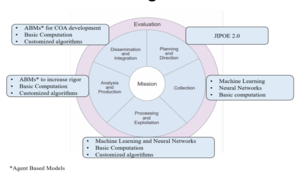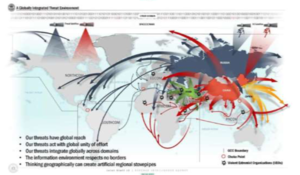
Global Strategy Amidst the Globe’s Cultures: Cultures in Individual Cognition, States and the Global System
Global Strategy Amidst the Globe’s Cultures: Cultures in Individual Cognition, States and the Global System Author | Editor: Wright, N. (Intelligent Biology) Executive Summary How can the US make global strategy in a world both vast and rich with cultural diversity? This matters: the US shaped the global system more than any other power since 1945, and […]
Continue ReadingThinking About the Future War: Too Much Technology, Not Enough Politics
“Thinking About the Future War: Too Much Technology, Not Enough Politics“ Speaker: Freedman, L. (King’s College, London) Date: 18 October 2019 Speaker Session Preview SMA hosted a speaker session presented by Prof. Lawrence Freedman (King’s College, London) as a part of its SMA General Speaker Series. Prof. Freedman first provided a series of observations on how new technologies are introduced […]
Continue ReadingDrivers and Ramifications of US Sanctions Policy Towards Russia
“Drivers and Ramifications of US Sanctions Policy Towards Russia“ Speaker: Conley, H. (Center for Strategic and International Studies (CSIS)) Date: 10 October 2019 Speaker Session Preview SMA hosted speaker session presented by Ms. Heather Conley (Center for Strategic and International Studies (CSIS)) as a part of its SMA General Speaker Series. During her brief, Ms. Conley discussed the effectiveness of […]
Continue Reading
Computation and Artificial Intelligence for Integrated Campaigning
“Computation and Artificial Intelligence for Integrated Campaigning“ Speaker: Pike, T. (National Intelligence University) Date: 9 October 2019 Speaker Session Preview SMA hosted speaker session presented by LTC Thomas Pike (National Intelligence University) as a part of its Future of Global Competition & Conflict Speaker Series. During part two of his two-part brief, LTC Pike focused on a primary argument made in his […]
Continue Reading
Global Competition: Planning Globally Integrated Operations
Global Competition: Planning Globally Integrated Operations Authors | Editors: Elder, R. (George Mason University); Levis, A. (George Mason University) Abstract With support from GTRI, GMU worked with Strategic Multilayer Assessment (SMA) Subject Matter Experts (SMEs) to identify preferred, acceptable, and sustainable strategic outcomes for the U.S. and its partners. Decomposing these outcomes into causal effects and influencers served as […]
Continue ReadingUnited States Country Report- An NSI Aggrieved Populations Analysis
United States Country Report- An NSI Aggrieved Populations Analysis Author | Editor: Kuznar, L. (NSI, Inc.) Executive Summary Data Four datasets on wealth and status distribution in the United States were analyzed: 2016, 2010, and 2007 World Bank quintile and decile estimates of income, and 2017 US Bureau of Labor statistics income deciles. Results Overall the population […]
Continue ReadingThe Opioid Crisis: China, National Security, and the Undeclared Conflict
Speakers: Bremseth, L. R. (Ret.); Giordano, J. (Georgetown University); Reist, D. (Knowledge Management Inc. (KMI)); von Trytek, A. (Drug Enforcement Administration (DEA)) Date: 6 September 2019 Speaker Session Preview SMA hosted a panel discussion as a part of its SMA General Speaker Series. Presenters included Prof. James Giordano (Georgetown University), CAPT (Ret.) L. R. Bremseth, Brig. Gen. David G. Reist (Knowledge Management […]
Continue ReadingAmerica’s S&T and Dynamics of Great Power Competition
“America’s S&T and Dynamics of Great Power Competition“ Speaker: Coletta, D. (US Air Force Academy) Date: 9 August 2019 Speaker Session Preview SMA hosted a speaker session presented by Mr. Damon Coletta (US Air Force Academy) as a part of its Future of Global Competition & Conflict Speaker Series. Mr. Coletta first stated that the US needs to find a better balance […]
Continue ReadingThe United States, Iran, and the Politics of the JCPOA
“The United States, Iran, and the Politics of the JCPOA” Speaker: Ansari, A. (University of St. Andrews / Royal United Services Institute (RUSI)) Date: 7 August 2019 Speaker Session Preview SMA hosted a speaker session presented by Professor Ali Ansari (University of St. Andrews / Royal United Services Institute (RUSI)) as a part of its SMA CENTCOM Speaker […]
Continue ReadingOvercoming “the Silo Effect” in the Department of Defense
Overcoming “the Silo Effect” in the Department of Defense Author: Lyle, D. (Air Education and Training Command (AETC) and Air University) Executive Summary Different perspectives and operational goals across services allows for specialized expertise, but also creates a vulnerability for silo creation. At times, these silos can inhibit cooperation, limit mission effectiveness, and leave critical decision points inadequately […]
Continue Reading